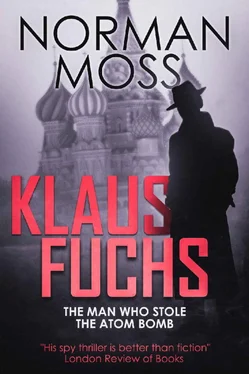Norman Moss is a writer, journalist and broadcaster. Other highly acclaimed titles by the author include Men Who Play God: the Story of the Hydrogen Bomb ; A British/American Dictionary ; The Pleasures of Deception ; and The Politics of Uranium .
‘Admirable… It tells an extraordinary story clearly and well, and with just enough analysis to provoke thought’ NEW SCIENTIST
‘A compelling story’ INDEPENDENT
‘It probes deeply… well worth reading’ NEW YORK TIMES
Men Who Play God: The Story of the Hydrogen Bomb
‘An important book’ GUARDIAN
‘Full of illumination… fascinating’ NEW YORKER
The Pleasures of Deception
‘Skilful and entertaining’ SUNDAY TELEGRAPH
© Norman Moss 1987
First published in Great Britain by Grafton Books in 1987.
This edition published by Sharpe Books in 2018.
Arthur Koestler, Arrow in the Blue .
This is unfair. When the Enabling Act to give extraordinary powers to Hitler came up in the Reichstag, some Socialists were under arrest, but eighty-four attended and voted against the Act, despite browbeating and threats by the Nazis.
See, for instance, the important book The Origins of Totalitarian Democracy by J. L. Talmon. Talmon argues that the fundamental political conflict in our time is between liberal and what he calls totalitarian democracy.
In those days spies were not respectable, and no countries admitted employing them. These are more frank and permissive times, and Ruth Kuczynski, now living in well-earned retirement in East Germany, was allowed to publish her memoirs, as well as some fictional spy thrillers. Her memoirs do not say she was Fuchs’s contact, but this can easily be deduced from them. See the notes at the end of this book.
From ‘The Soviet Decision to Build the Atomic Bomb, 1939-45’, in Social Studies of Science , 1981.
I was at a boarding school in New York, and I remember well us all being taught in chapel to sing the rousing Cossack Song. — NM
Fuchs was using the word ‘schizophrenia’ in a way that it is used often, and inaccurately, by laymen, to mean a division into two distinct personalities, Dr Jekyll and Mr Hyde being the classic example. Used correctly, it means a psychotic disorder involving complete emotional disorientation.
Teller played a crucial role in the invention of the hydrogen bomb in 1951.
Harry S. Truman, 1945: Year of Decisions .
G. K. Zhukov, Reminiscences and Reflections . This passage is quoted and translated by David Holloway in The Soviet Union and the Arms Race .
County boundaries have been changed, and today Harwell is in Oxfordshire.
Margaret Gowing, Independence and Deterrence: Britain and Atomic Energy, 1945-52.
As I have written elsewhere, that phrase ‘including atomic weapons’ must be one of the great throwaway lines of British history. — NM
In a radio interview with me for a programme about Klaus Fuchs, broadcast by the BBC on 1 August 1977. — NM
This is told in Ignotus’s autobiographical book Political Prisoner .
Behan recalled this episode in a record of talk and songs.
This was what the original announcement of the Hiroshima bomb said was its power. Subsequent analysis showed it to be about thirteen kilotons.
See Peter Wright’s book about MI5, Spycatcher .
Certainly the case cast a shadow of doubt over the foreign-born scientists who had done secret war work. The wife of one of these said years later, ‘I must admit I was secretly pleased when Burgess and Maclean and Philby turned out to be spies. They were not foreign, they were not Jewish, they were true-blue British and had been to the best schools and to Cambridge.’
I obtained a copy of the full confession from the FBI files in Washington DC, and used it as source material. It is reprinted in the Appendix. This is the first time it has been published in Britain. — NM
Dean Acheson, Present at the Creation , Norton, New York, 1969.
This must have been a mistake. She visited him in Brixton but not in Wormwood Scrubs.
Portal, as Viscount Portal of Hungerford, became head of the atomic energy programme after the war; he told this story to another official of the programme after Fuchs was sent to prison, and this official told it to me. — NM
Quoted in Robert Jungk, Brighter than a Thousand Suns .
It is a plausible supposition. The Hungarian General Bela Kiraly, who commanded a Soviet Bloc army before he fled to the West after the Soviet invasion of Hungary in 1956, told an interviewer that Soviet acquisition of the atomic bomb allowed Russia to give North Korea the go-ahead to invade. ‘It gave Stalin a kind of security that the Soviet Union was no longer a target which could not reciprocate in kind,’ he said. See Michael Charlton, The Eagle and the Small Birds , BBC, London, 1984.
The Home Secretary, whose formal title is Secretary of State for Home Affairs.
I interviewed Henry Arnold and Mrs Skinner for a radio programme about Fuchs that was broadcast in 1976 and 1977. Both died before I began my researches for this book.
Otto Frisch talked to me about Fuchs in a conversation some years ago, and I have drawn on this at one or two points. He died before I began this book.












